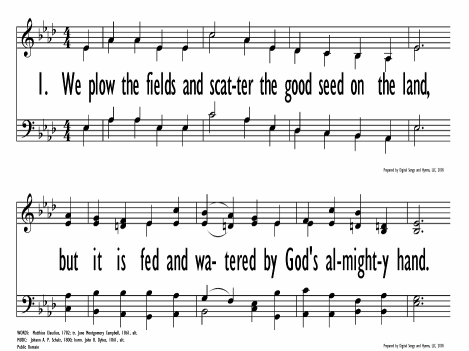- |
User Links
We plough the fields, and scatter

We plough the fields, and scatter
Author: Matthias Claudius (1782); Translator: Jane M. Campbell (1861)Tune: WIR PFLÜGEN
Published in 467 hymnals
Printable scores: PDF, MusicXMLPlayable presentation: Lyrics only, lyrics + musicAudio files: MIDI, Recording
Representative Text
1 We plow the fields and scatter the good seed on the land,
But it is fed and watered by God’s almighty hand.
He sends the snow in winter, the warmth to swell the grain,
The breezes and the sunshine, and soft refreshing rain.
Refrain:
All good gifts around us are sent from heav’n above;
Then thank the Lord, O thank the Lord for all His love.
2 He only is the maker of all things near and far;
He paints the wayside flower, He lights the evening star.
The wind and waves obey Him, by Him the birds are fed;
Much more to us, His children, He gives our daily bread. [Refrain]
3 We thank You, our Creator, for all things bright and good:
The seedtime and the harvest, our life, our health, our food.
Accept the gifts we offer for all Your love imparts;
Accept what You most welcome: our humble, thankful hearts! [Refrain]
Source: One and All Rejoice #337
Author: Matthias Claudius
 Claudius, Matthias, son of Matthias Claudius, Lutheran pastor at Reinfeld in Holstein (near Lübeck), was born at Reinfeld, Aug. 15, 1740. An ancestor, who died as a Lutheran pastor in 1586, had Latinized his name, Claus Paulsen, to Claudius Pauli, and his descendants had adopted Claudius as their surname. Claudius entered the University of Jena, in 1759, as a student of theology, but being troubled with an affection of the chest, and finding little attraction in the Rationalism of Jena, he turned his attention to law and languages. After a short visit to Copenhagen, as private secretary to a Danish count, he joined in 1768 the staff of the Hamburg News Agency (Adress-Comptoirnachrichten). Removing to Wandsbeck, near Hamburg, he undertook i… Go to person page >
Claudius, Matthias, son of Matthias Claudius, Lutheran pastor at Reinfeld in Holstein (near Lübeck), was born at Reinfeld, Aug. 15, 1740. An ancestor, who died as a Lutheran pastor in 1586, had Latinized his name, Claus Paulsen, to Claudius Pauli, and his descendants had adopted Claudius as their surname. Claudius entered the University of Jena, in 1759, as a student of theology, but being troubled with an affection of the chest, and finding little attraction in the Rationalism of Jena, he turned his attention to law and languages. After a short visit to Copenhagen, as private secretary to a Danish count, he joined in 1768 the staff of the Hamburg News Agency (Adress-Comptoirnachrichten). Removing to Wandsbeck, near Hamburg, he undertook i… Go to person page >Translator: Jane M. Campbell
 Campbell, Jane Montgomery, daughter of the Rev. A. Montgomery Campbell, born in London, 1817, died at Bovey Tracey, Nov. 15, 1878. Miss Campbell contributed in 1861, a number of translations from the German to the Rev. C. S. Bere's Garland of Songs; or, an English Liederkranz, 1862; and also to his Children’s Choral Book, 1869. The best known and most widely used of these translations is a portion of "Im Anfang war's auf Erden," as the harvest hymn, "We plough the fields and scatter.” Miss Campbell also published A Handbook for Singers, Lond., Society for Promoting Christian Knowledge, n.d. This small work contains the musical exercises which she taught in her father's parish school.
--John Julian, Dictionary of Hymnology (1907)
Go to person page >
Campbell, Jane Montgomery, daughter of the Rev. A. Montgomery Campbell, born in London, 1817, died at Bovey Tracey, Nov. 15, 1878. Miss Campbell contributed in 1861, a number of translations from the German to the Rev. C. S. Bere's Garland of Songs; or, an English Liederkranz, 1862; and also to his Children’s Choral Book, 1869. The best known and most widely used of these translations is a portion of "Im Anfang war's auf Erden," as the harvest hymn, "We plough the fields and scatter.” Miss Campbell also published A Handbook for Singers, Lond., Society for Promoting Christian Knowledge, n.d. This small work contains the musical exercises which she taught in her father's parish school.
--John Julian, Dictionary of Hymnology (1907)
Go to person page >Text Information
Related Texts
| First Line: | We plough the fields, and scatter |
| German Title: | Wir pflügen und wir streuen |
| Author: | Matthias Claudius (1782) |
| Translator: | Jane M. Campbell (1861) |
| Meter: | 7.6.7.6 D with refrain |
| Language: | English |
| Refrain First Line: | All good gifts around us |
| Notes: | Spanish translation: See "Aramos nuestros campos" by Ernesto Barocio |
| Copyright: | Public Domain |
- (hymns)
- (hymns)
- (hymns)
- (hymns)
- (hymns)
- (hymns)
- (hymns)
- (hymns)
- (hymns)
- (hymns)
- (hymns)
- (hymns)
- (hymns)
- (hymns)
- (hymns)
- (hymns)
- (hymns)
- (hymns)
- (hymns)
- (hymns)
- (hymns)
- (hymns)
- (hymns)
- (hymns)
- (hymns)
- (hymns)
- (hymns)
- (hymns)
- (hymns)
- (hymns)
- (hymns)
- (hymns)
- (hymns)
- (hymns)
- (hymns)
- (hymns)
- (hymns)
- (hymns)
- (hymns)
- (hymns)
- (hymns)
- (hymns)
- (hymns)
- (hymns)
- (hymns)
- (hymns)
- (hymns)
- (hymns)
Chinese
English
- A Book of Chorales: And supplemental hymns #98
- A Church of England Hymn Book: adapted to the daily services of the Church throughout the year #575
- A First Book in Hymns and Worship #18
- A Hundred Songs of God and His Kingdom #d93
- A Hymnal and Service Book for Sunday Schools, Day Schools, Guilds, Brotherhoods, etc. #409
- A Hymnal for Friends #149
- A Manual of Worship: for the chapel of Girard College #228
- A Treasury of Hymns: The best-loved hymns, carols, anthems, children's hymns, and gospel songs #300
- A. M. E. C. Hymnal #196
- African Methodist Episcopal Church Hymnal #579 10 shown out of 367
French
Spanish
Notes
Scripture References:
st. 1 = Ps. 145:16, Ezek. 34:26-27
st. 2 = Ps. 104, Acts 14:17
st. 3 = Gen. 8:22
Matthias Claudius (b. Reinfeld, Holstein, Germany, 1740; d. Hamburg, Germany, 1815) grew up in the home of a Lutheran pastor and studied briefly for the ministry at the University of Jena. During his twenties and thirties he seems to have forsaken the faith, influenced by the rationalistic thought of the time. He became seriously ill in 1777, and this crisis was instrumental in returning him to his childhood faith. He worked briefly as commissioner of agriculture and manufacture of Hesse-Darmstadt (1776-1777) and in 1778 was appointed an auditor of the Schleswig-Holstein Bank in Altona. Most of his life was spent as a journalist, editor, and writer on general culture, much of it as editor of Der Wansbecker Bote (The Wansbeck Messenger).
Claudius also wrote many devotional poems, of which this is the only one in common use as hymn text. Originally a poem in seventeen stanzas with a refrain that began "Im Anfang war's auf Erden," the poem was the peasants' song in Claudius's sketch "Paul Erdmann's Feast," published in Asinus omnia sua secum portans (1782). It was popularized in various nineteenth-century German hymnals where it appeared with fewer stanzas, often beginning with Claudius's third stanza "Wir pflugen und wir streuen.”
The English text is based on Jane Montgomery-Campbell's free translation of his original stanzas 3, 5, 7,9, 10, and 13, first published in Charles S. Bere's A Garland of Songs (1861). Campbell (b. Paddington, London, England, 1817; d. Bovey Tracey, South Devon, England, 1878) was proficient in both music and German. She translated a number of German hymns into English, which were first published in Charles Bere's Garland of Songs, or an English Liederkranz (1862) and his Children's Chorale Book (1869). The writer of A Handbook for Singers (undated), Campbell also taught singing to the children in her parish school, St. James in Paddington, where her father was rector.
The text affirms that, while we need to plow the land and sow the seed, it is God who provides the increase; he sends the rain and the sunshine to produce a harvest. God also sustains his creation, for "all good gifts around us are sent from heaven above." Thus praise bursts from our "humble, thankful hearts."
Liturgical Use:
Harvest thanksgiving; as a hymn of creation; the final stanza as an offertory hymn.
--Psalter Hymnal Handbook
Access an additional article on the Canterbury Dictionary of Hymnology:
Tune
WIR PFLÜGENWIR PFLÜGEN (named after the incipit of Schulz’s original third stanza) was published anonymously in the Hanover collection Lieder für Volksschulen (1800). But it was credited to Johann A. P. Schulz in Lindner’s Berlin songbook Jungenfreund (1812). The harmonization by John B. Dykes (PHH 147)…
Timeline
Arrangements
Media
- MIDI file from The Cyber Hymnal #7227
- Audio recording from Evangelical Lutheran Worship #681
- MIDI file from Psalter Hymnal (Gray) #456
- MIDI file from Psalter Hymnal (Gray) #456
- MIDI file from The Service of Praise #36
- Audio recording from Trinity Hymnal (Rev. ed.) #714
- MIDI file from Worship in Song: A Friends Hymnal #44


 My Starred Hymns
My Starred Hymns





